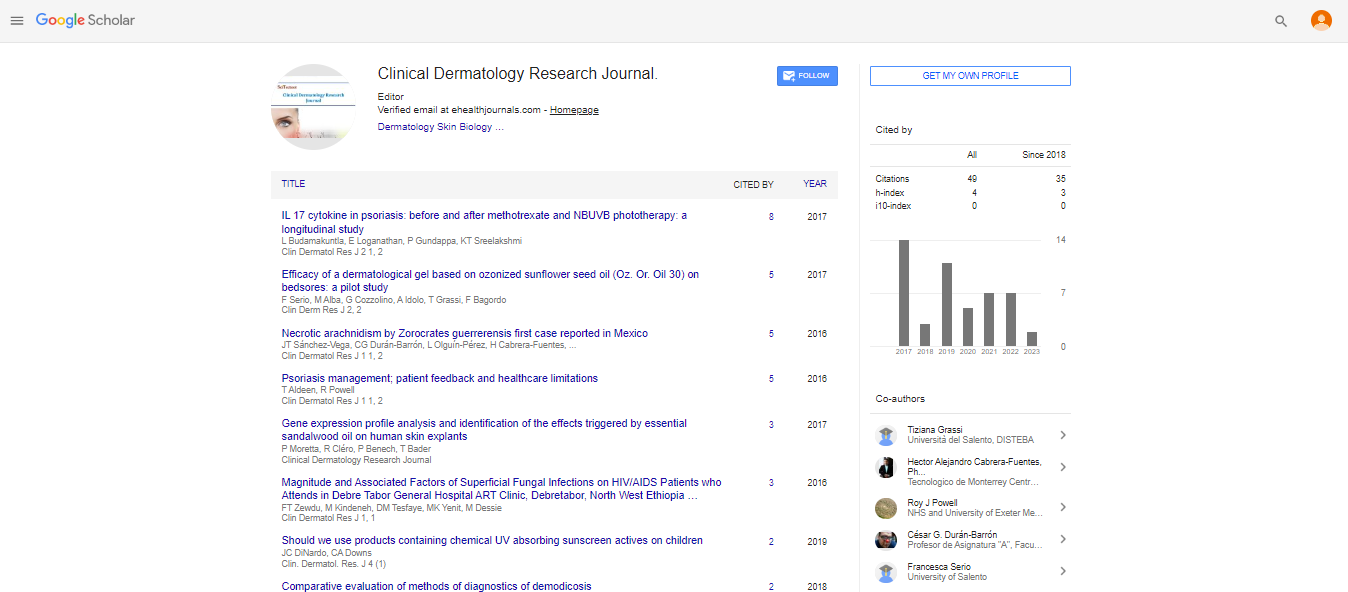Dimerization of JC-3 effectively enhances anti-atopic effect by downregulation of T cell activation
Hyun Su Lee
Daegu Catholic university, South Korea
: J Clin Exp Dermatol Res
Abstract
JC-3, benzylideneacetophenone derivative ((2E)-3-(4-hydroxy-3-methoxyphenyl)phenylpro-2-en-l-one (JC3)) has revealed its anti- atopic effect on trimellitic anhydride (TMA)–induced atopic dermatitis (AD)–like symptoms in mice. Nevertheless its potential to attenuate AD manifestations, whether its dimerization form significantly enhance the anti-atopic effect is still not known. In this study, we investigated the more therapeutic potential of dimerized JC-3 in AD by controlling T-cell activation than JC-3 monomer. JC-3 decreased the expression of IL-2 mRNA in stimulated Jurkat T cells using anti-CD3/CD28 antibodies, PMA/A23187 and superantigen- loaded Raji B cells, however, JC-3 dimerization showed to more powerful effects on T cells. Results from CCK assay and PI staining assay showed that treatment with JC-3 monomer and dimer form have no cytotoxicity in resting and activated condition on Jurkat T cells. As shown in JC-3 monomer study, JC-3 dimerization of JC-3 significantly reduces MAP kinase including ERK, p38 and JNK signaling in activated T cells and its suppressive effects are stronger than JC-3 monomer. Here, we selected animal model to show whether JC-3 dimerization attenuates AD symptoms more than JC-3. To induce AD, two ear lobes of mice were painted with 1% DNCB and 10 mg/ml house dust mite extract every 3-4 days for 4 weeks. JC-3 (5, 10 mg/kg) and dimerized JC-3 (5, 10 mg/ kg) were orally treated once daily from day 1 to day 28 before DNCB/mite extract treatment. Oral administration of JC-3 alleviated the symptoms of atopic dermatitis, including ear thickness, scratching number, sizes and weight of draining lymph nodes. Interestingly, oral administration of JC-3 dimerization showed stronger effects than oral administration of JC-3 monomer. Therefore, results of this study provide a molecular basis for developing new therapeutics for the treatment of AD by upgrading structural alterations.
Biography
Hyunsu Lee received his master and Ph.D. from Gwangju Institute of Science and Technology in 2016 with thesis titled “Effects and mechanism of natural bioactive small molecules on the treatment of atopic dermatitis under supervision of Dr. Prof. Chang-Duk Jun. He expanded his research on immunology by joining Dr. Charles Egwuagu’s lab as postdoctoral researcher in Lab of Immunology, National Eye Institute, National Institute of Health in United State. After postdoctoral training, he focused research on the discovery of bioactive small molecules that attenuate atopic dermatitis by modulation of T cell activity and keratinocyte activity. Currently, he joined Department of Physiology, Daegu Catholic University School of Medicine as assistant professor from 2022 and run his own lab focusing on discovery of molecular mechanism of bioactive small molecules that suppress atopic dermatitis in vivo.
 Spanish
Spanish  Chinese
Chinese  Russian
Russian  German
German  French
French  Japanese
Japanese  Portuguese
Portuguese  Hindi
Hindi 

